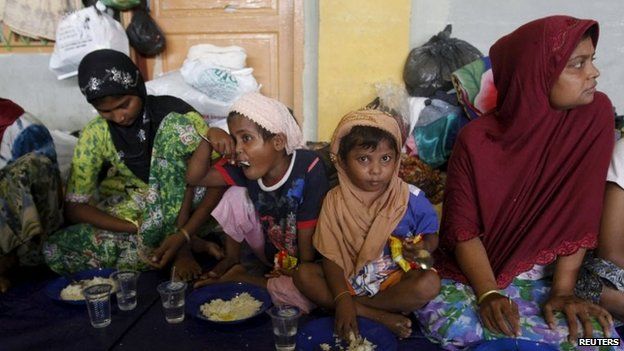Myanmar Rohingya migrants 'begging for help' from boat
- Published

A group of 350 migrants from Myanmar have told an activist by phone that they have been abandoned by their crew and need help.
The migrants, including 50 women and 84 children, say they have had no food or water for three days.
The passengers were calling for help and crying down the phone, said Chris Lewa of the Arakan Project which works with the Rohingya ethnic minority.
The migrants are not sure where they are and their boat is drifting.
"They say the boat is a Thai boat and the crew and captain are Thai. They have been two months at sea. The day before yesterday crew and captain abandoned the boat, arranged a boat for themselves, and they took parts of the engine so it's not working," Ms Lewa told the BBC on Tuesday.
Signalling for help
The migrants' location is unclear but they think they may be close to the Malaysian island of Langkawi. They can see land and they said they have seen several ships in the area and have signalled for help but none has approached.
Earlier on Tuesday, Indonesia said it had turned away a boat the previous day carrying hundreds of migrants believed to be from Myanmar and Bangladesh.
Indonesia's navy said it provided the vessel with food and water on Monday before sending it back out to sea.
It said that it did so because the migrants wanted to reach Malaysia, but an international migration agency said the decision was "shocking".
Analysis - Jill McGivering, BBC News
So far, South East Asian countries have been reluctant to tackle this issue. For a start, they don't want to offend Myanmar whose poor treatment of the Rohingyas is at the heart of the problem. Thailand's plan to bring together officials from origin and destination countries is an important acknowledgement of the need for co-ordinated action.
But it is less clear what it might achieve. The timing of the meeting - still several weeks away - is a slow response to a very immediate crisis. Thousands of migrants are stranded at sea. The latest decision by the Indonesian military to push back several hundred is a worrying precedent. Even for those who arrive safely in Thailand, Malaysia and Indonesia and are classed as refugees, the future is bleak.
Many stay in overcrowded detention centres or community housing - but they remain marginalised with no access to formal education and work. The Rohingyas are seen as an unwelcome burden and, with the surge in numbers this year, only a tiny percentage will fulfil the dream of final settlement in a third country.
As many as 8,000 migrants from Bangladesh and Myanmar are believed by the International Organization for Migration (IOM) to be stranded at sea.
Correspondents say people smugglers who ferry the migrants are now reluctant to follow their usual route through Thailand because of a government campaign there against them.
IOM spokesman Joe Lowry told the BBC that people on board such ships needed urgent help as there were many reports of passengers suffering from beriberi - a disease caused by vitamin deficiency.
"Beriberi leaves you like a walking skeleton - they will need immediate humanitarian assistance," he said.
The journey the migrants take - from Bangladesh or Myanmar through the Bay of Bengal to Thailand or beyond - takes several weeks. They have been slowed further by the refugees effectively being held hostage by smugglers.
"There are cases documented of people who have been at sea since early March waiting for boats to fill up and ransoms to be paid," said Mr Lowry.
Who are the Rohingyas?
- Rohingyas are a distinct, Muslim ethnic group mainly living in Myanmar, which is also known as Burma
- Thought to be descended from Muslim traders who settled there more than 1,000 years ago
- Also live in Bangladesh, Saudi Arabia and Pakistan
- In Myanmar, they are regularly persecuted - subjected to forced labour, have no land rights, and are heavily restricted
- In Bangladesh many are also desperately poor, with no documents or job prospects
On Sunday and Monday more than 2,000 migrants arrived in Malaysia or Indonesia after being rescued or swimming ashore.
Jeff Labovitz, another IOM spokesman, told the BBC on Monday that the discovery last week of dozens of human remains in abandoned camps in the south of Thailand had prompted a police crackdown and therefore people smugglers were avoiding their usual route and holding their boats at sea.
- Published25 November 2012
- Published23 July 2012